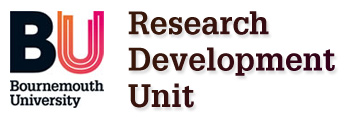 It’s a beautiful summer’s day and to celebrate the new academic year the Research Development Unit has some exciting news – the launch of the BU Research Development Fund!
It’s a beautiful summer’s day and to celebrate the new academic year the Research Development Unit has some exciting news – the launch of the BU Research Development Fund!
The Research Development Fund (RDF) is open to BU academics and will provide selective support to research initiatives considered to be of strategic importance to BU. There are two strands to the RDF: i) Small Grants Scheme (up to £2k per application); and ii) Large Collaborative Grants Scheme (up to £25k per annum, must include two or more Schools). It is envisaged that each year approximately 20 small grants will be awarded and one large collaborative grant.
Awards will only cover direct costs (i.e. overheads and established staff costs will not be reimbursed). Applications need to include a precise breakdown of costs calculated using full economic costing (fEC) methodology – this will be calculated for you by the CRE Operations team.
All decisions on funding will be made by the University R&E Forum (UREF).
An overview of the two schemes is provided below. For further information please read the Research Development Fund Policy.
RDF – Small Grants Scheme (up to £2k per award) – There will be three competitions per annum. Academic staff wishing to apply must submit an application form to the PVC (Research, Enterprise and Internationalisation) via the RDU by the scheme deadlines:
- 31 October 2011
- 28 February 2012
- 31 May 2012
Priority will be given to applications that involve staff from two or more Schools and/or those from early career researchers.
Examples of research activities covered by the RDF include:
- Pilot projects
- Pump-priming
- Interview transcription
- Fieldwork
- Visiting major libraries, museums, other research institutions, etc.
- Organisation of an academic conference at BU with external participants
- Attendance at external networking events leading to collaborative research proposals
- Meetings with external organisations to establish collaborations
- Preparation of specialist material or data
- Short-term Research Assistant support or replacement teaching
- Research consumables and equipment (providing it is clear these would not normally be purchased by the School)
To apply for a Small Grant, please complete the RDF-SGS application form.
RDF – Large Collaborative Grants Scheme (up to £25k per award) – There will be one competition per annum. Academic staff wishing to apply must submit an application form to the PVC (Research, Enterprise and Internationalisation) via the RDU by the scheme deadline:
The RDF – Large Collaborative Grants Scheme aims to provide funding for the development of large-scale, complex, inter/multi-disciplinary collaborative research activities leading to external funding. Applications must involve academic staff from at least two BU Schools. Priority will be given to applications that meet the following criteria:
- In line with BU’s emerging Research Themes
- Include external organizations (particularly SMEs and/or international organizations)
- In line with the strategic priorities of major funding bodies (such as the UK research councils, European Commission, etc)
- Clearly beneficial to BU’s submission to REF2014
Examples of research activities covered by the RDF include:
- Pilot projects
- Pump-priming
- Meeting expenses
- Travel to proposed collaborators
- Attendance at external networking events with the aim of expanding the network
- Preparation of specialist material or data
- Short-term Research Assistant support or replacement teaching
- Consumables and equipment (providing it is clear these would not normally be purchased by the School)
- Fees for external proposal support and review
To apply for a Large Collaborative Research Grant, please complete the RDF-LCGS application form.
 Prof Colin Pritchard’s study comparing the effectiveness of the NHS with health services in 16 other western countries is published in the Journal of the Royal Society of Medicine, and was featured in The Guardian today. You can read the full story on The Guardian website – ‘NHS among developed world’s most efficient health systems, says study’
Prof Colin Pritchard’s study comparing the effectiveness of the NHS with health services in 16 other western countries is published in the Journal of the Royal Society of Medicine, and was featured in The Guardian today. You can read the full story on The Guardian website – ‘NHS among developed world’s most efficient health systems, says study’
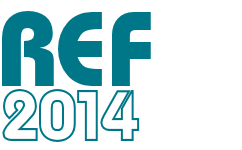



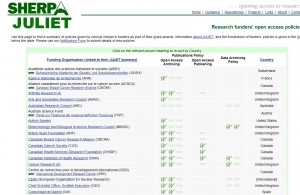
 Hopefully this will help to increase BU’s compliance with funders’ open access requirements as well as increasing the visibility and impact of BU’s research 🙂
Hopefully this will help to increase BU’s compliance with funders’ open access requirements as well as increasing the visibility and impact of BU’s research 🙂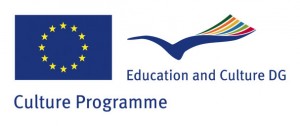
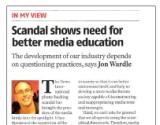 In the last few days, BU academics have achieved a series of major results by having their expertise featured in key national media outlets.
In the last few days, BU academics have achieved a series of major results by having their expertise featured in key national media outlets.
 Congratulations to Rudy Gozlan and the Conservation Ecology and Environmental Sciences Group (ApSci) for winning an Erasmus Mundus award from the European Commission. The TECHNO project aims to develop cooperation between Asian and European HEIs through the exchange of students and staff. The project will start later this year and will contribute significantly to the research culture in ApSci. This is excellent news considering BU’s push to grow its European activity and international networking. Well done to Jonathan Wardle (MS) for securing 5 license renewals for CEMP’s Parashoot tool as well as winning a CPD contract with Pearson Education Ltd. Congratulations are also due to Steve Calver (and the MRG team, ST) for a contract with Bath Preservation Trust, Clive Andrewes (HSC) for winning a CPD contract with Care UK and also for running a dementia short course in September, and to Les Todres (HSC) who will be running a masterclass on interpretive phenomenological analysis in November. Well done to everyone involved in these projects!
Congratulations to Rudy Gozlan and the Conservation Ecology and Environmental Sciences Group (ApSci) for winning an Erasmus Mundus award from the European Commission. The TECHNO project aims to develop cooperation between Asian and European HEIs through the exchange of students and staff. The project will start later this year and will contribute significantly to the research culture in ApSci. This is excellent news considering BU’s push to grow its European activity and international networking. Well done to Jonathan Wardle (MS) for securing 5 license renewals for CEMP’s Parashoot tool as well as winning a CPD contract with Pearson Education Ltd. Congratulations are also due to Steve Calver (and the MRG team, ST) for a contract with Bath Preservation Trust, Clive Andrewes (HSC) for winning a CPD contract with Care UK and also for running a dementia short course in September, and to Les Todres (HSC) who will be running a masterclass on interpretive phenomenological analysis in November. Well done to everyone involved in these projects!
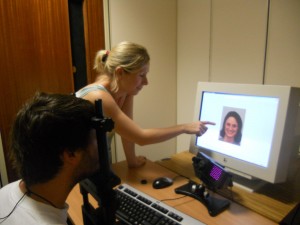 Prosopagnosia, or face blindness, refers to a severe deficit in recognizing familiar people from their face. The condition affects people in different ways with some experiencing difficulties in the recognition of faces and others experiencing problems recognising other things, such as objects, cars, or animals, as well as faces. Many of those people diagnosed with prosopagnosia report difficulties in other aspects of face processing, such as judging age or gender, and the majority report navigational difficulties.
Prosopagnosia, or face blindness, refers to a severe deficit in recognizing familiar people from their face. The condition affects people in different ways with some experiencing difficulties in the recognition of faces and others experiencing problems recognising other things, such as objects, cars, or animals, as well as faces. Many of those people diagnosed with prosopagnosia report difficulties in other aspects of face processing, such as judging age or gender, and the majority report navigational difficulties. 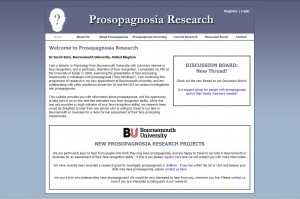
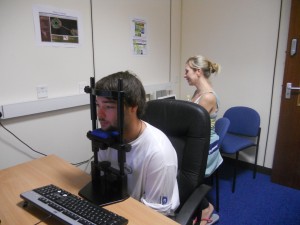 Sarah is also interested in whether face blindness is hereditary and physiological rather than psychological. She is colaborating with genetics researchers to test families of prosopagnosics and examine any links. The research is ongoing, but initial findings suggest prosopagnia is hereditry, but not always. Sarah’s research aims to identify the sub-types and various causes of prosopagnia, and to improve public understanding of the condition, as well as increasing the early diagnosis of the condition in children.
Sarah is also interested in whether face blindness is hereditary and physiological rather than psychological. She is colaborating with genetics researchers to test families of prosopagnosics and examine any links. The research is ongoing, but initial findings suggest prosopagnia is hereditry, but not always. Sarah’s research aims to identify the sub-types and various causes of prosopagnia, and to improve public understanding of the condition, as well as increasing the early diagnosis of the condition in children. Research round-up: we’re not getting smarter but we do know our whiskey
Research round-up: we’re not getting smarter but we do know our whiskey
 It’s a beautiful summer’s day and to celebrate the new academic year the Research Development Unit has some exciting news – the launch of the
It’s a beautiful summer’s day and to celebrate the new academic year the Research Development Unit has some exciting news – the launch of the 
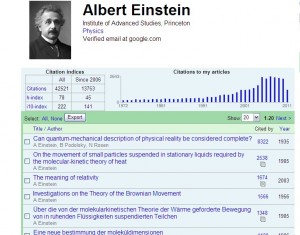

 Back in April it was announced that BU would be launching an Open Access Publication Fund in August 2011 (see the previous blog post here:
Back in April it was announced that BU would be launching an Open Access Publication Fund in August 2011 (see the previous blog post here: 










 New CMWH paper on maternity care
New CMWH paper on maternity care From Sustainable Research to Sustainable Research Lives: Reflections from the SPROUT Network Event
From Sustainable Research to Sustainable Research Lives: Reflections from the SPROUT Network Event REF Code of Practice consultation is open!
REF Code of Practice consultation is open! ECR Funding Open Call: Research Culture & Community Grant – Apply now
ECR Funding Open Call: Research Culture & Community Grant – Apply now ECR Funding Open Call: Research Culture & Community Grant – Application Deadline Friday 12 December
ECR Funding Open Call: Research Culture & Community Grant – Application Deadline Friday 12 December MSCA Postdoctoral Fellowships 2025 Call
MSCA Postdoctoral Fellowships 2025 Call ERC Advanced Grant 2025 Webinar
ERC Advanced Grant 2025 Webinar Update on UKRO services
Update on UKRO services European research project exploring use of ‘virtual twins’ to better manage metabolic associated fatty liver disease
European research project exploring use of ‘virtual twins’ to better manage metabolic associated fatty liver disease